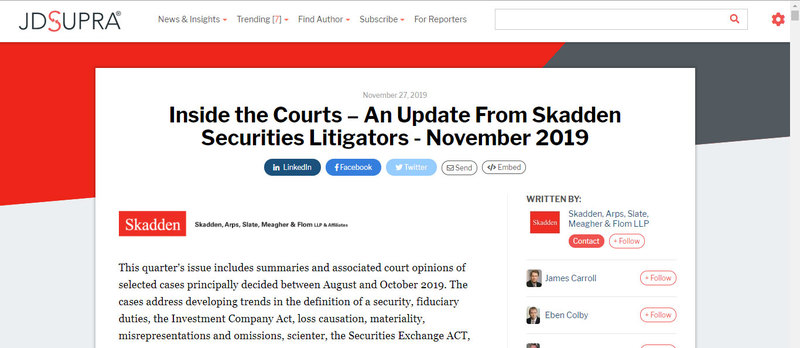Inside the Courts – An Update From Skadden Securities Litigators - November 2019
This quarter’s issue includes summaries and associated court opinions of selected cases principally decided between August and October 2019. The cases address developing trends in the definition of a security, fiduciary duties, the Investment Company Act, loss causation, materiality, misrepresentations and omissions, scienter, the Securities Exchange ACT, securities fraud pleading standards and SLUSA.
Definition of a Security
Fiduciary Duties
Investment Company Act
Loss Causation
Materiality
Misrepresentations and Omissions
Securities Exchange Act
Securities Fraud Pleading Standards
SLUSA
Definition of a Security
Ninth Circuit Holds That Investments in EB-5 Immigrant Investor Program Qualify as ‘Securities’
SEC v. Feng, No. 17-56522 (9th Cir. Aug. 23, 2019)
The Ninth Circuit affirmed summary judgment in favor of the U.S. Securities and Exchange Commission (SEC), holding that pooled investments made pursuant to the EB-5 immigration program qualify as “securities” and therefore can give rise to liability under the federal securities laws.
The U.S. Immigrant Investor Program, known more commonly as the EB-5 program, provides legal permanent residency in the United States to foreign nationals who invest in U.S.-based projects. Under this program, qualified immigrants can gain U.S. visas if they make a direct investment of at least $1 million in a new commercial enterprise that creates at least 10 full-time jobs for U.S. workers. Multiple foreign investors are permitted to pool their money in the same enterprise, as long as each investment results in the creation of 10 jobs. Pooled investments are made through “regional centers,” which offer specific projects to investors and manage the pooled investments.
Hui Feng, the defendant, is an immigration lawyer who led approximately 150 clients through the EB-5 process. On December 7, 2015, the SEC filed a civil complaint against Feng and his law firm, alleging that Feng committed fraud and failed to register as a broker-dealer, both in violation of the federal securities laws. The parties cross-moved for summary judgment in the district court, with Feng arguing that the EB-5 investments were not “securities” because the investors had no expectation of profit, and only expected to obtain a green card. The district court held that the EB-5 investments were “securities” and granted summary judgment to the SEC.
On appeal, the Ninth Circuit affirmed. The court explained that the Securities Act defines “security” broadly, enumerating a long list of financial instruments that qualify, including any “investment contract.” An “investment contract,” in turn, is “a contract, transaction or scheme whereby a person invests his money in a common enterprise and is led to expect profits solely from the efforts of the promoter or a third party.” The inquiry is an objective one, and courts are to consider the character of the instrument or transaction based on what the purchasers were led to expect, including what was contained in any promotional materials.
Here, the regional centers’ promotional materials repeatedly referred to the investments as “securities” and specifically stated that the offerings were made pursuant to U.S. securities laws. In addition, the EB-5 transactions were structured as investments in limited partnerships, with the promise of a fixed annual return on the investment, ranging from 0.5% to 5%. Both attributes — investment in a limited partnership and the promise of a fixed rate of return — are classic features of an investment contract. The court also rejected Feng’s argument that the investments should not be considered a “security” because the investors were motivated by the promise of a visa, not profits. While the court did not doubt that obtaining a visa was the investors’ primary motive, their interest in a visa was necessarily tied to the financial success of the regional center’s project. Indeed, only a successful investment that creates 10 full-time jobs can secure a visa for the investor. Moreover, the record showed that many of Feng’s client-investors sought out EB-5 projects with higher rates of return. Thus, the investments were made with an expectation of profit, and qualify as “securities.”
https://www.jdsupra.com/legalnews/inside-the-courts-an-update-from-30681/
Mentions
Litigation Cases
States
- California
Securities Disclaimer
This website is for informational purposes only and does not constitute an offer or solicitation to sell shares or securities. Any such offer or solicitation will be made only by means of an investment's confidential Offering Memorandum and in accordance with the terms of all applicable securities and other laws. This website does not constitute or form part of, and should not be construed as, any offer for sale or subscription of, or any invitation to offer to buy or subscribe for, any securities, nor should it or any part of it form the basis of, or be relied on in any connection with, any contract or commitment whatsoever. EB5Projects.com LLC and its affiliates expressly disclaim any and all responsibility for any direct or consequential loss or damage of any kind whatsoever arising directly or indirectly from: (i) reliance on any information contained in the website, (ii) any error, omission or inaccuracy in any such information or (iii) any action resulting therefrom.




